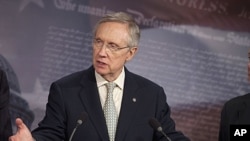U.S. political leaders remained deadlocked Saturday over how best to raise the country's borrowing limit and cut government spending, three days ahead of a looming national debt default.
Rival Republican and Democratic plans to raise the country's debt limit of $14.3 trillion and rein in the nation's deficit-laden annual budgets call for many of the same provisions. But agreement on a compromise has proved elusive.
The White House and congressional leaders are expected to talk further on Saturday in an effort to reach an agreement. Meantime, the Republican-led House of Representatives is planning to take up - and likely defeat - a rival debt plan produced by the Democratic Senate Majority Leader Harry Reid.
For his part, Reid is planning a Senate test vote on his revamped measure early Sunday. It is an unusual time for a vote, but the timing is made necessary by various Senate rules as the rival political parties rush to avoid what would be a first for the U.S. - a default on at least some of its bills.
Democratic leaders in the Senate are hoping to complete their action on a debt limit increase by early Monday morning, just before U.S. stock markets reopen for the week. The deadlocked Washington debt negotiations have roiled investors, with the key Dow Jones Industrial Average of stocks dropping more this past week than it has in 14 months.
Republicans are calling for a short-term fix and new consideration of the debt ceiling in early 2012, while Democrats are pushing for a plan to cover the nation's borrowing needs through next year and past the presidential and congressional elections in November 2012.
In his weekly address Saturday, President Barack Obama said the two sides must reach a compromise by the Tuesday deadline so the U.S. will have the ability to pay its bills on time. He said the parties are not that far apart on the issues involved, and said the results of failing to come to an agreement would be "inexcusable."
On Friday, the Democratic-controlled Senate blocked a Republican plan to raise the country's borrowing limit. Just hours before, the House of Representatives had narrowly approved the bill put forth by House Speaker John Boehner.
Obama says the Boehner plan would hold the economy captive to Washington politics once again by forcing the nation to relive the debt crisis in just a few months.
Boehner's plan called for an immediate $900 billion increase of the U.S. debt ceiling in exchange for more than $900 billion in spending cuts over the next 10 years. It offers to raise the debt limit again early next year if Washington can work out more spending cuts and send to the country's 50 states a proposal for a constitutional amendment requiring the national government to balance its budget each year.
In the weekly Republican address Saturday, Senator Jon Kyl said Republicans have been united in the belief that raising the debt ceiling without making significant spending cuts would be "irresponsible."
Some information for this report was provided by AP, AFP and Reuters.




